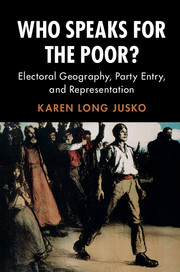Book contents
- Frontmatter
- Dedication
- Epigraph
- Contents
- List of Figures
- List of Tables
- Preface and Acknowledgments
- 1 Who Speaks for the Poor?
- 2 How Electoral Geography Matters
- 3 New Parties and the Changing Electoral Geography of Contemporary Democracies, 1880–2000
- 4 The Populists and “Third-Party Men” in America
- 5 Strategic Entry of the CCF and Social Credit in Canada
- 6 The Implications of Electoral Geography for British Labour
- 7 The Swedish Social Democratic Party, and the Long-Term Implications of Electoral Reform
- 8 “It Didn't Happen Here”: The General Implications of Electoral Geography for the Political Representation of the Poor
- References
- Index
- Miscellaneous Endmatter
Preface and Acknowledgments
Published online by Cambridge University Press: 05 September 2017
- Frontmatter
- Dedication
- Epigraph
- Contents
- List of Figures
- List of Tables
- Preface and Acknowledgments
- 1 Who Speaks for the Poor?
- 2 How Electoral Geography Matters
- 3 New Parties and the Changing Electoral Geography of Contemporary Democracies, 1880–2000
- 4 The Populists and “Third-Party Men” in America
- 5 Strategic Entry of the CCF and Social Credit in Canada
- 6 The Implications of Electoral Geography for British Labour
- 7 The Swedish Social Democratic Party, and the Long-Term Implications of Electoral Reform
- 8 “It Didn't Happen Here”: The General Implications of Electoral Geography for the Political Representation of the Poor
- References
- Index
- Miscellaneous Endmatter
Summary
This book is the result of a decade-long effort to understand how electoral rules affect the political representation of low-income citizens. In practice, individuals’ votes are (almost) never weighted equally in the tallying of election results: legislatures are limited in size, and seats are almost always contested in districts. When the relationship between votes and seats for groups (rather than individuals) is examined, differences between national vote shares and seat shares can be profound. Groups vary in their electoral power because of the way their members are distributed across districts, and because of the way seats are allocated. What are the consequences of inequality in electoral power, particularly differences in the electoral power of income groups, for public policy and, ultimately, the common good?
My dissertation, completed while I was a visiting graduate student in the Center for the Study of Democratic Politics (CSDP) at Princeton University, provides the motivation for this larger project. A key finding in my dissertation shows that the electoral power of a low-income voting bloc varies across countries. That is, if all low-income citizens (defined as the poorest third in each country) turned out to vote, and they all cast ballots for the same parties, they would elect dramatically different proportions of their legislatures, despite their equivalent shares of each population. This variation transcends the usual distinction between majoritarian and proportional representation: there are consequential differences in the electoral power of the poor, even among countries with similar electoral systems. Importantly, low-income Americans were most under-represented in the mapping of votes to seats, and were pivotal in only about 5 percent of contests for the House of Representatives. (Chapter 8 replicates this analysis with new data, and a new measurement strategy.)
When viewed from the perspective of electoral power, it is not surprising that American legislators appear more responsive to their wealthier constituents (see Gilens 2012, Bartels 2008). American legislators rarely rely on the electoral support of low-income voters, and few have incentives to be responsive to their interests.
- Type
- Chapter
- Information
- Who Speaks for the Poor?Electoral Geography, Party Entry, and Representation, pp. xv - xviiiPublisher: Cambridge University PressPrint publication year: 2017



